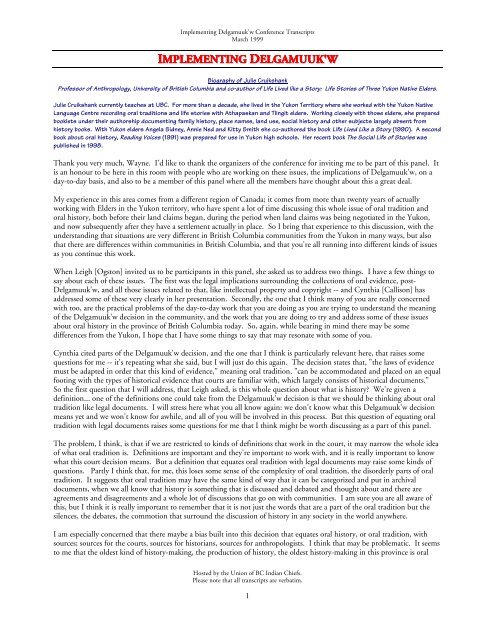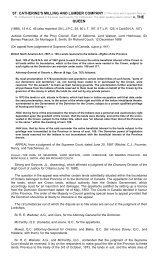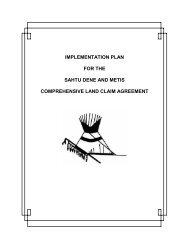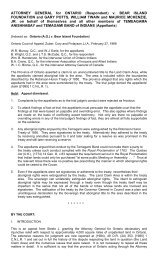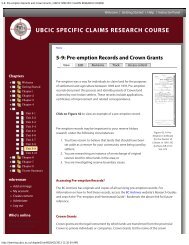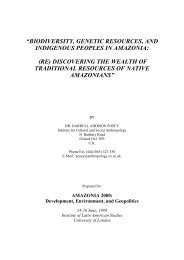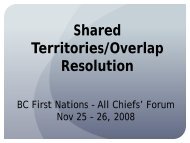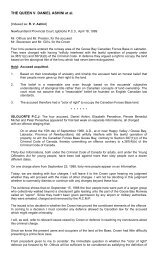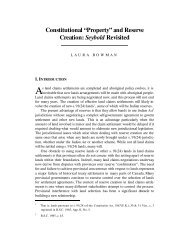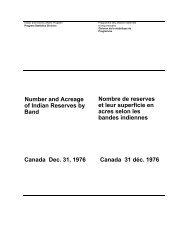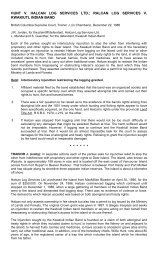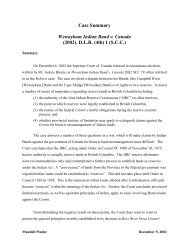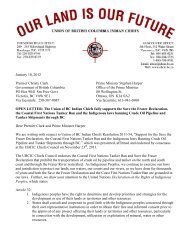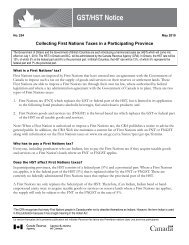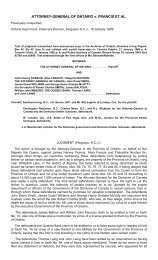Julie Cruikshank - Union of British Columbia Indian Chiefs
Julie Cruikshank - Union of British Columbia Indian Chiefs
Julie Cruikshank - Union of British Columbia Indian Chiefs
Create successful ePaper yourself
Turn your PDF publications into a flip-book with our unique Google optimized e-Paper software.
Implementing Delgamuuk’w Conference Transcripts<br />
March 1999<br />
IMPLEMENTING DELGAMUUK'W<br />
Biography <strong>of</strong> <strong>Julie</strong> <strong>Cruikshank</strong><br />
Pr<strong>of</strong>essor <strong>of</strong> Anthropology, University <strong>of</strong> <strong>British</strong> <strong>Columbia</strong> and co-author <strong>of</strong> Life Lived like a Story: Life Stories <strong>of</strong> Three Yukon Native Elders.<br />
<strong>Julie</strong> <strong>Cruikshank</strong> currently teaches at UBC. For more than a decade, she lived in the Yukon Territory where she worked with the Yukon Native<br />
Language Centre recording oral traditions and life stories with Athapaskan and Tlingit elders. Working closely with those elders, she prepared<br />
booklets under their authorship documenting family history, place names, land use, social history and other subjects largely absent from<br />
history books. With Yukon elders Angela Sidney, Annie Ned and Kitty Smith she co-authored the book Life Lived Like a Story (1990). A second<br />
book about oral history, Reading Voices (1991) was prepared for use in Yukon high schools. Her recent book The Social Life <strong>of</strong> Stories was<br />
published in 1998.<br />
Thank you very much, Wayne. I'd like to thank the organizers <strong>of</strong> the conference for inviting me to be part <strong>of</strong> this panel. It<br />
is an honour to be here in this room with people who are working on these issues, the implications <strong>of</strong> Delgamuuk'w, on a<br />
day-to-day basis, and also to be a member <strong>of</strong> this panel where all the members have thought about this a great deal.<br />
My experience in this area comes from a different region <strong>of</strong> Canada; it comes from more than twenty years <strong>of</strong> actually<br />
working with Elders in the Yukon territory, who have spent a lot <strong>of</strong> time discussing this whole issue <strong>of</strong> oral tradition and<br />
oral history, both before their land claims began, during the period when land claims was being negotiated in the Yukon,<br />
and now subsequently after they have a settlement actually in place. So I bring that experience to this discussion, with the<br />
understanding that situations are very different in <strong>British</strong> <strong>Columbia</strong> communities from the Yukon in many ways, but also<br />
that there are differences within communities in <strong>British</strong> <strong>Columbia</strong>, and that you're all running into different kinds <strong>of</strong> issues<br />
as you continue this work.<br />
When Leigh [Ogston] invited us to be participants in this panel, she asked us to address two things. I have a few things to<br />
say about each <strong>of</strong> these issues. The first was the legal implications surrounding the collections <strong>of</strong> oral evidence, post-<br />
Delgamuuk'w, and all those issues related to that, like intellectual property and copyright -- and Cynthia [Callison] has<br />
addressed some <strong>of</strong> these very clearly in her presentation. Secondly, the one that I think many <strong>of</strong> you are really concerned<br />
with too, are the practical problems <strong>of</strong> the day-to-day work that you are doing as you are trying to understand the meaning<br />
<strong>of</strong> the Delgamuuk'w decision in the community, and the work that you are doing to try and address some <strong>of</strong> these issues<br />
about oral history in the province <strong>of</strong> <strong>British</strong> <strong>Columbia</strong> today. So, again, while bearing in mind there may be some<br />
differences from the Yukon, I hope that I have some things to say that may resonate with some <strong>of</strong> you.<br />
Cynthia cited parts <strong>of</strong> the Delgamuuk'w decision, and the one that I think is particularly relevant here, that raises some<br />
questions for me -- it's repeating what she said, but I will just do this again. The decision states that, "the laws <strong>of</strong> evidence<br />
must be adapted in order that this kind <strong>of</strong> evidence," meaning oral tradition, "can be accommodated and placed on an equal<br />
footing with the types <strong>of</strong> historical evidence that courts are familiar with, which largely consists <strong>of</strong> historical documents."<br />
So the first question that I will address, that Leigh asked, is this whole question about what is history? We're given a<br />
definition... one <strong>of</strong> the definitions one could take from the Delgamuuk'w decision is that we should be thinking about oral<br />
tradition like legal documents. I will stress here what you all know again: we don't know what this Delgamuuk'w decision<br />
means yet and we won't know for awhile, and all <strong>of</strong> you will be involved in this process. But this question <strong>of</strong> equating oral<br />
tradition with legal documents raises some questions for me that I think might be worth discussing as a part <strong>of</strong> this panel.<br />
The problem, I think, is that if we are restricted to kinds <strong>of</strong> definitions that work in the court, it may narrow the whole idea<br />
<strong>of</strong> what oral tradition is. Definitions are important and they're important to work with, and it is really important to know<br />
what this court decision means. But a definition that equates oral tradition with legal documents may raise some kinds <strong>of</strong><br />
questions. Partly I think that, for me, this loses some sense <strong>of</strong> the complexity <strong>of</strong> oral tradition, the disorderly parts <strong>of</strong> oral<br />
tradition. It suggests that oral tradition may have the same kind <strong>of</strong> way that it can be categorized and put in archival<br />
documents, when we all know that history is something that is discussed and debated and thought about and there are<br />
agreements and disagreements and a whole lot <strong>of</strong> discussions that go on with communities. I am sure you are all aware <strong>of</strong><br />
this, but I think it is really important to remember that it is not just the words that are a part <strong>of</strong> the oral tradition but the<br />
silences, the debates, the commotion that surround the discussion <strong>of</strong> history in any society in the world anywhere.<br />
I am especially concerned that there maybe a bias built into this decision that equates oral history, or oral tradition, with<br />
sources; sources for the courts, sources for historians, sources for anthropologists. I think that may be problematic. It seems<br />
to me that the oldest kind <strong>of</strong> history-making, the production <strong>of</strong> history, the oldest history-making in this province is oral<br />
Hosted by the <strong>Union</strong> <strong>of</strong> BC <strong>Indian</strong> <strong>Chiefs</strong>.<br />
Please note that all transcripts are verbatim.<br />
1
Implementing Delgamuuk’w Conference Transcripts<br />
March 1999<br />
tradition. It's thousands <strong>of</strong> years old, it's been going on in this province forever. The kind <strong>of</strong> history-making that we<br />
sometimes see in academic writing or in the court process is a much more recent notion <strong>of</strong> history. So, again, I think it's<br />
important to think about oral tradition as history-making, as part <strong>of</strong> the production <strong>of</strong> history, and to push this idea with<br />
the courts that this is not evidence, it's not sources: it's history. Ken Harris, I think, has discussed this eloquently in his<br />
discussion this morning. It's about the making <strong>of</strong> history.<br />
All societies, I think, have their own understandings and their own debates and their own discussions about what history<br />
means. We all know that there are certain ideas -- and, again, Ken Harris has mentioned this morning -- there are some<br />
histories in First Nations communities that are meant to be discussed in the feast hall, they are not meant to be discussed in<br />
the court. But there are other areas where there are things that can be discussed and the debates can become public, and<br />
those may be the ones that may be important to take into consideration in debates about what we mean by history and what<br />
we mean by oral history. So my sense <strong>of</strong> this is that we need to think really hard about oral history as historical practice, as<br />
history, not merely as sources, not merely as evidence, not merely as "like legal documents." Again, I would suggest that<br />
while the court gives them some definitions to think with, we don't want to be bound by those definitions because it can<br />
constrict the range <strong>of</strong> ways that people can talk about their histories and oral histories.<br />
The second question, though, is one that is probably more concerned to those <strong>of</strong> you who are working in communities<br />
looking at the practical issues <strong>of</strong> how to do research that may have some validity in the courts. Again, I have this feeling<br />
that if we are bound by the court's definitions, which may be broad -- as Cynthia was mentioning, it may be broadening the<br />
notions <strong>of</strong> oral history or it may be narrowing them in some ways -- but if we take the court's definitions that oral traditions<br />
are sources, then the main issue for researchers becomes one <strong>of</strong> a kind <strong>of</strong> archival documentation, an idea <strong>of</strong> recording<br />
individual testimonies, an idea <strong>of</strong> preserving tapes, an idea <strong>of</strong> archiving these, organizing them, and ordering them. While I<br />
think that's all very important, it pushes it in a certain kind institutional direction that may raise problems later on by<br />
narrowing that definition <strong>of</strong> what oral history is. In the Yukon territory there has been so much discussion about this<br />
because people have been involved in this process for twenty-five years. One <strong>of</strong> the things that people have talked about<br />
recently is the idea, as well as recording traditions and having a record <strong>of</strong> what those traditions are, the issue <strong>of</strong> preservation<br />
is not so much about preserving words as about preserving spaces where people can talk about history in a public context.<br />
Those are the kinds <strong>of</strong> spaces that have been eradicated in many ways by colonial processes in this province and, indeed, in<br />
this country. It is creating situations where people can talk about these issues and, again following what Ken Harris was<br />
saying, there are certain things that, <strong>of</strong> course, shouldn't be talked about outside the feast hall. But what has been done<br />
recently in the Yukon is younger people are creating situations for talking about oral history by organizing what they call<br />
Elders Festivals, and these are situations and festivals that... for instance, one that happened a couple <strong>of</strong> summers ago, it was<br />
set a hundred miles away from Whitehorse, thirty miles away from the community <strong>of</strong> Tesland and it was a place where<br />
families and people and Elders and young people and other invited guests could come and talk about history, and about the<br />
fact that not everybody always agrees about issues about history, but that these are issues that can be discussed in a situation<br />
where there can be discussion about these issues, all <strong>of</strong> which, again, have relevance in court situations. These are situations<br />
where it's negotiated very clearly, the whole idea <strong>of</strong> taping -- not only taping, because while these are taped by the young<br />
people in the communities, the authorship <strong>of</strong> the copyright remains with the community -- but there is not just a discussion<br />
about taping, there is the discussion about the process, about how the work should be recorded: whether they should be<br />
recorded exactly as Elders are saying them or what these issues are about, the whole issue <strong>of</strong> the ideas <strong>of</strong> recording history.<br />
There is an amazing amount <strong>of</strong> discussion that happens not only about history, but about this process <strong>of</strong> recording oral<br />
history and what is appropriate practice, what people should believe should be done. And these ideas change all the time.<br />
The question that we are asked about, how does that kind <strong>of</strong> rules about how you make contract law and look at the kinds<br />
<strong>of</strong> authorship and contract releases and so on are tremendously important. My sense is that they change. They change<br />
from year to year, from week to week, from day to day and it is important to always have the people who are doing the<br />
recording making those decisions at the time about what they would consider appropriate practice in this context.<br />
The reason for thinking about preserving places, creating places, I think, is that it does what I think is important in looking<br />
at history: it shows that history is always located in social and political universes. It's different, maybe, from recording<br />
history with individual persons because, when you're recording in a larger setting, the social and political context remains<br />
central and remains foremost, and I think this is the case with history all <strong>of</strong> the time and probably in all places. I think that<br />
it also allows the possibility <strong>of</strong> challenging the institutions, like the academic institutions that Cynthia has referred to, or the<br />
courts, or archival practice to make sure that the Elders are central in the process <strong>of</strong> deciding what oral history is and how it<br />
should be used in different contexts. At the same time these issues <strong>of</strong> preserving and recording continue to be important<br />
and it is something that I know people in Yukon communities consider to be very, very critical.<br />
Hosted by the <strong>Union</strong> <strong>of</strong> BC <strong>Indian</strong> <strong>Chiefs</strong>.<br />
Please note that all transcripts are verbatim.<br />
2
Implementing Delgamuuk’w Conference Transcripts<br />
March 1999<br />
So these two questions, I think, which Leigh asked us to address, one is really what is history, what is oral history, what does<br />
this mean in the context <strong>of</strong> Delgamuuk'w? The second is what does this mean for people who are working on the ground<br />
in practical situations in communities? I think my conclusions would be, first, that we must be aware <strong>of</strong> the court's rules,<br />
but we can't let those court's rules define or constrict what is meant by oral tradition and oral history. Both speakers, I<br />
think, have addressed this in their presentations this morning. We must be aware, but always thinking about pushing those<br />
boundaries about how it can be used in ways that work, in ways that are important for the community and how history is<br />
part <strong>of</strong> a social process <strong>of</strong> history-making. It's not just sources, it is history-making, and history-making is done by living<br />
human beings who are a part <strong>of</strong> that history-making, and that goes on. History is being made now in communities in<br />
<strong>British</strong> <strong>Columbia</strong> and the Yukon and everywhere, and that oral history continues to be important. It is not just from the<br />
past, it's present and it's critical now.<br />
Secondly, the question about preserving and making sure that accounting for preservation. I think the important thing is<br />
thinking about preserving and creating settings for debate and discussions in communities where Elders are able to debate<br />
with one another about some <strong>of</strong> these issues, and to talk in ways that allow these issues to be discussed so that history is<br />
something that is discussed daily in communities and that is the record that continues to be a part <strong>of</strong>, eventually, the court<br />
record as well. The debates are important, the recording is important. And, again, in Yukon discussions at the Elders<br />
Festivals and at the Yukon International Storytelling Festival, which is held each year, there's really a conscious effort to<br />
record this and to make sure that it's always checked again with the speakers so that they are always aware <strong>of</strong> how their<br />
words might be recorded and transcribed and they have the final say on how those words can be used in particular kinds <strong>of</strong><br />
situations.<br />
I would just say, too, that the Yukon International Storytelling Festival, I think, is a remarkable setting, is a public space in<br />
which oral history is discussed, because -- and that continued during the land claims negotiations and it continues now --<br />
festivals like this are <strong>of</strong>ten interesting and good places to talk about political issues, because festivals are seen as places that<br />
are kind <strong>of</strong> safe places to speak because they are usually thought <strong>of</strong> as being for broad communities. They're not thought <strong>of</strong><br />
as charged political events, and yet they allow people to speak very strongly about the political and legal implications <strong>of</strong> the<br />
work they're doing and <strong>of</strong> their own notions <strong>of</strong> history in a public context where others are listening and are able hear oral<br />
tradition continuing to be passed on. So thank you.<br />
Hosted by the <strong>Union</strong> <strong>of</strong> BC <strong>Indian</strong> <strong>Chiefs</strong>.<br />
Please note that all transcripts are verbatim.<br />
3


